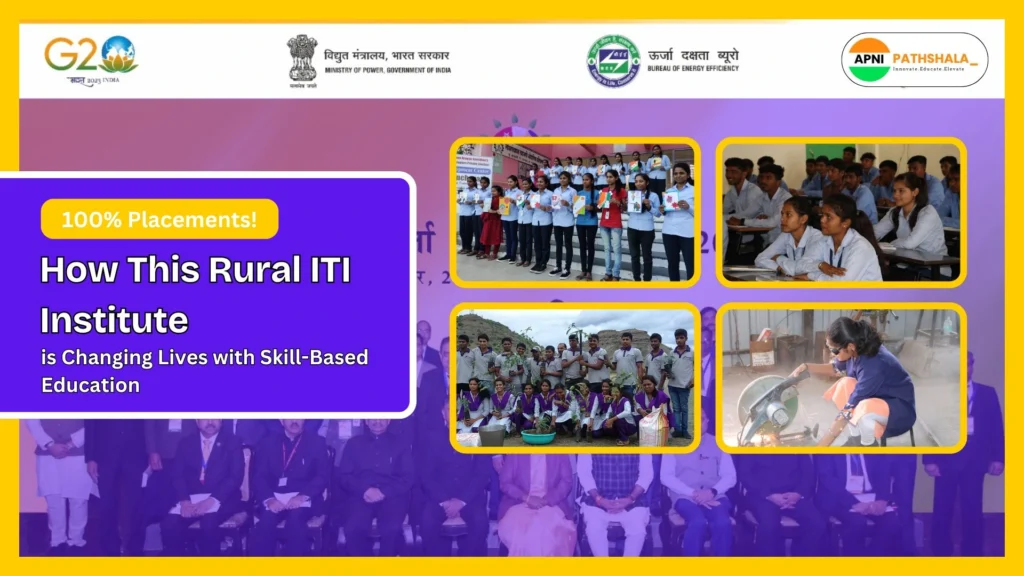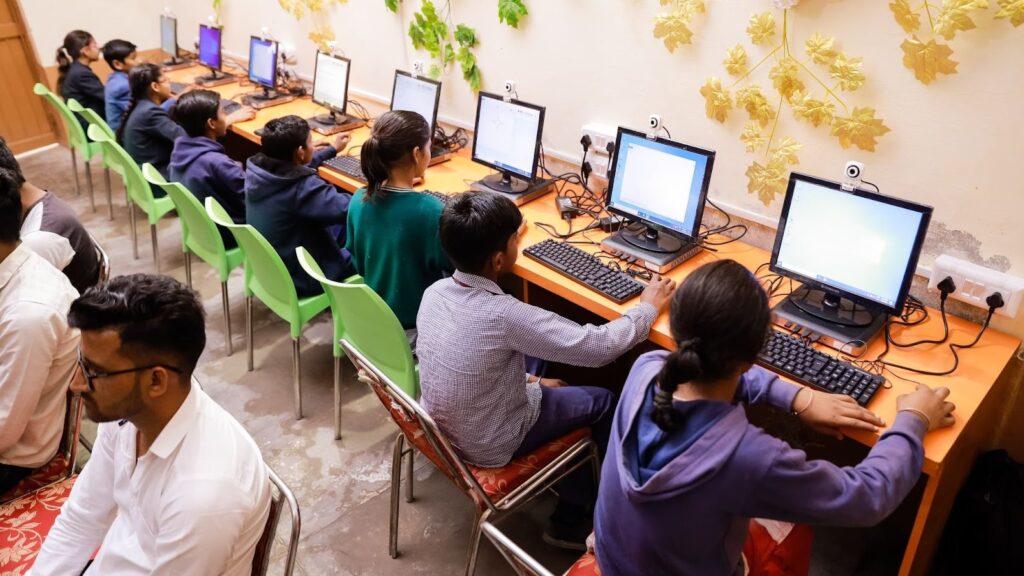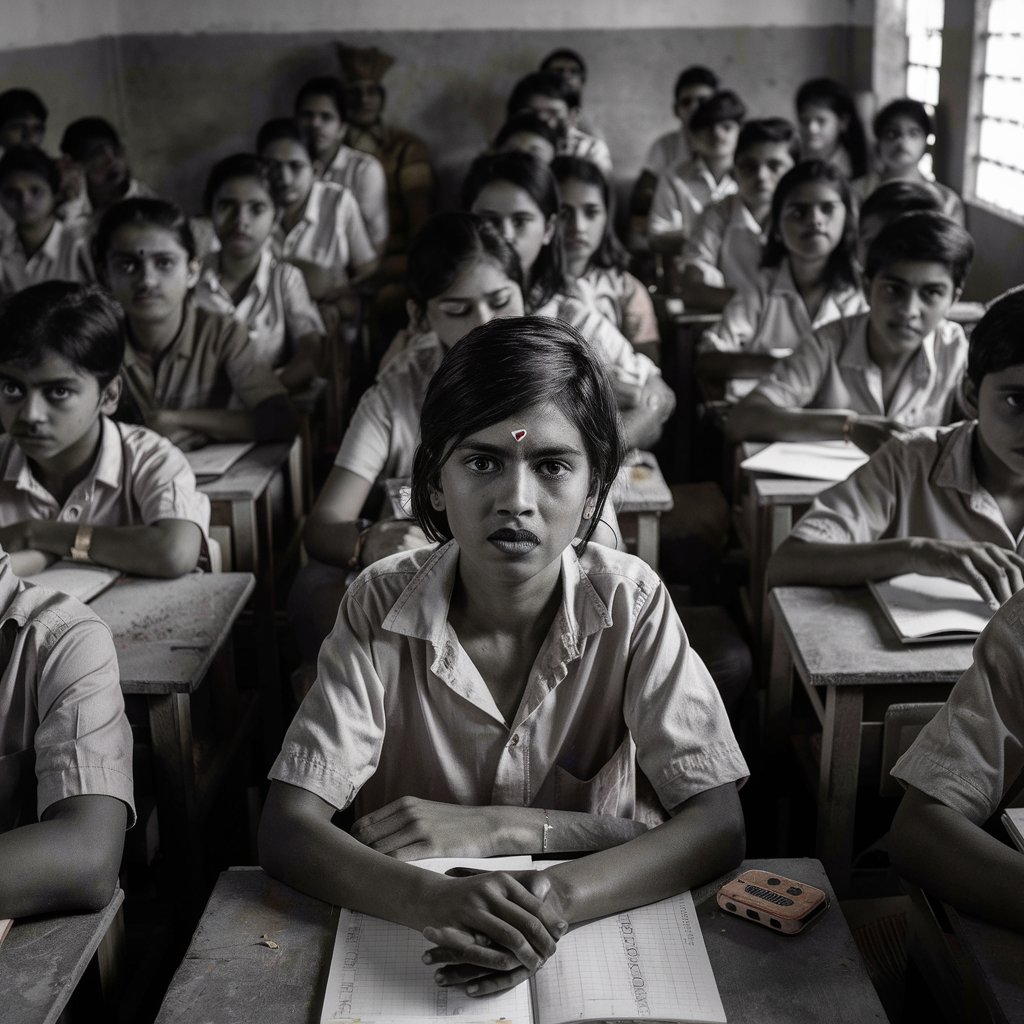How This Rural ITI Institute is Changing Lives with Skill-Based Education (100% Placements!)

Ever seen a child fix a broken fan at home? Or repair a bike with just a screwdriver? Now, imagine if that child actually got the right training, where could they be in life? In many rural areas, kids don’t get that chance. They grow up helping their parents on farms, learning skills from observation, but never getting a proper education. It’s not because they don’t want to study, but because there’s nowhere to learn the skills that actually lead to jobs. That’s exactly why Lok Panchayat’s Rural Technical Training Institute (RTTI) was started—to give practical, job-ready skills to students who wouldn’t otherwise have a chance. Today, hundreds of students have been trained and placed in companies, proving that education doesn’t just happen in classrooms; it happens in real-life learning too. This is the story of how a small technical training institute in a remote village changed lives, won national awards, and doubled its students in just a year. All thanks to skill-based education and a little support from Apni Pathshala. A Vision That Started in the Middle of a Jungle Lok Panchayat, a non-profit, was established in 1993, but it was in 2012 that the Rural Technical Training Institute (RTTI) came to life. Set up in a tribal area, surrounded by jungle, this institute was built to solve a real problem—farmers and their children had no access to education or technical knowledge. In these communities, children would naturally follow their parents into farming, but without proper training, they struggled to use modern equipment. They had the potential but no resources to learn. That’s where RTTI stepped in. With a focus on ITI (Industrial Training Institute) education, the institute started training students in skills that actually matter—electrician work, automobile knowledge, welding, fabrication, computer numerical control (CNC) machines, and more. Companies even started collaborating with them, recognizing the quality of training being provided. But starting an institute in such a remote area wasn’t easy. The Challenges: Distance, Trust, and Acceptance Building a school is one thing. Convincing parents to send their kids there is another. And trust me, it was way harder than it seems. When RTTI first started, it took one full year to convince families that this training could change their children’s future. By 2014, the institute was fully running, but another major challenge appeared—distance. The institute was 40 km away from the nearest district. Parents were hesitant to send their children so far every day. Many simply couldn’t afford transportation. So, RTTI came up with a life-changing solution—a free hostel with food and accommodation. This helped students focus on learning without worrying about travel costs or daily commutes. And the results? Life-changing. Who knew the institute that began in the midst of a jungle, would go on to become the best rural ITI institute out there. From Rural Students to Skilled Professionals Today, 150–200 students are part of this best ITI institute, receiving hands-on training. But the best part? 100% job placements. With government support and industry collaborations, the students at RTTI are not just learning—they’re securing real jobs. Some students even get paid during their training based on their performance, making education an opportunity, not a financial burden. And recognition soon followed. In 2022, RTTI won the National Award by the Bureau of Energy Conservation in Vigyan Bhavan, Delhi. Why? Because the institute runs on solar power and green energy, significantly reducing energy consumption. That’s not all— But even with all these achievements, there was one major gap—technology. Apni Pathshala’s Role: How 20 Computers Changed Everything In rural areas, owning a computer is a luxury. Many students had never even touched one before coming to RTTI. When Dr. Aniruddha Malpani, the Managing Director of Apni Pathshala, visited the institute, he realized that the existing computers were outdated, with no proper software for learning. Apni Pathshala stepped in and sent 20 brand-new computers with updated software. The impact? The number of students doubled in just one year. For students who had never imagined working with modern technology, this was a dream come true. Now, they could learn computer-based skills that made them even more employable. What’s Next? The Future of RTTI While the institute has come a long way, there are still challenges to tackle: The journey isn’t over. But with the right support, opportunities, and training, RTTI will continue transforming lives—one student at a time. Why Does This Story Matters? This isn’t just about an institute, it’s about how skill-based education can change futures. In rural areas, education isn’t just about learning math or science, it’s about learning skills that put food on the table. RTTI has proved that when education meets real-life skills, opportunities multiply. And the best part? This is just the beginning. With Apni Pathshala’s support, the impact is growing. More students are getting access to modern tools, better training, and real-world opportunities. But there’s still a long way to go. Many students, especially girls, need encouragement and access to technical education. More courses, more resources, and more hands-on training can bridge the gap between dreams and reality. You can be a part of this transformation. Support Apni Pathshala today and help bring skill-based education to those who need it the most.
How ApniPathshala is Transforming Rural Education in Haryana.

In the quiet village of Sirsa, Haryana, where traditional values often overshadow modern ambitions, the pandemic brought education to still. Students struggled under the weight of increased syllabus, lacked personal guidance, and faced a gap in digital learning. But just when things seemed hopeless, ApniPathshala’s learning pod at the Jivam Foundation stepped in. A light of hope that turned challenges into opportunities and gave students a chance to dream again. The Beginning: Rising from the Ashes The pandemic of 2020 was not just a health crisis, it was a crisis of education. With schools closed and resources scarce, the future of countless children was surrounded by uncertainty. Recognizing the urgency, Jivam Foundation, led by the visionary Ms. Isha Godara, made the bold decision to convert a lifeless ancient building to a digital learning spot. Ms. Godara’s story is as inspiring as the foundation itself. Having completed her education in Alberta, Canada, she could have chosen a life of comfort and opportunity abroad. But her heart was rooted in Haryana, where she saw the potential to make change. Her decision to return home and create the Jivam Foundation shows her commitment to transforming the community through education and empowerment. “The building was locked and forgotten” shared Mr. Vikas Sheron, the coordinator of the learning pod. “We faced accusations from the villagers who called us frauds and doubted our intentions. But we didn’t stop, driven by the belief that education is the most powerful weapon for change.” Every essential like lighting, furniture, and Wi-Fi was set up with great effort. Despite the challenges and resistance, the foundation moved forward. Because of the vision. The dream of creating a welcoming space where students could grow and succeed. The Transformation Mr. Vikas Sheron, who joined the foundation in 2021, never imagined himself as a teacher. “I didn’t like teaching at first,” he admitted. “It wasn’t something I saw myself doing. But life brought everything together, and now I love it. The bond I share with the students is beyond professional, it’s personal, like a family.” What began as a small effort soon grew into a lively hub of digital learning and empowerment. From 8 a.m. to 4 p.m., students preparing for competitive exams come and sit in the learning pod & study together in a community. By late afternoon, the space transforms into a welcoming spot for younger children from grades 5 and 6, eager to learn after school. The journey wasn’t easy. One of the toughest challenges was changing societal mindsets. “In villages across Haryana, especially here, daughters weren’t allowed to study. Convincing parents to let their daughters join us wasn’t easy,” Mr. Sheron said. Yet, with time and persistence, the narrative changed. “Today, 70% of the students in our pod are girls, and they actively participate in programs and stage events,” he added with a sense of pride. A Partnership for Progress: Apni Pathshala’s Role The arrival of ApniPathshala brought a remarkable transformation to the learning pod. By donating us computer systems, it opened up a new world for students who had never even touched a computer before. “Thanks to ApniPathshala, our students have gone from having no digital learning exposure to mastering advanced skills,” shared Mr. Vikas. “It’s amazing to watch their confidence and abilities grow.” The impact is undeniable. Many students from the pod have successfully secured positions in various competitive fields, proving that their hard work and the support they received paid off. But the pod is more than just a place for academics. It’s a space where children develop life skills, resilience, and the courage to dream big. A Moment of Pride On the foundation’s first anniversary, the learning pod’s achievements were celebrated with a visit from Savita Poonia, the captain of the Indian Women’s Hockey Team. Her presence was more than just motivational, it was proof to what happens when passion meets perseverance. “She motivated us and appreciated our efforts,” Mr. Sheron recalled. “It was a moment of pride not just for the foundation but for the entire village.” Building Bonds, Changing Lives The foundation of the pod’s success is the special bond between the students and their teachers. “Learning is never one-way,” Mr. Sheron shared. “We learn something new from our students every day. Their feedback is incredibly valuable and pushes us to keep improving.” The pod is about so much more than academics. It’s a place where confidence is built, curiosity is nurtured, and opportunities are created for those who had none. Parents who were once unsure now stand as strong supporters of the initiative, attending PTMs and engaging actively with the teachers. A Legacy of Hope and Inspiration ApniPathshala’s learning pod at Jivam Foundation stands as proof of what’s possible when compassion meets commitment and when people dare to challenge societal norms for the greater good. This pod is not just reshaping rural education, it’s rewriting life stories, particularly for young girls in a community that once hesitated to support their dreams. Today, these same girls step onto stages with confidence, participate in programs, and walk on paths once considered impossible. This transformation reflects a powerful truth: when people come together with a shared purpose, obstacles disappear, and opportunities multiply. From an abandoned, crumbling building to a living hub of learning, the journey of this pod proves that even the smallest steps can create monumental change. It reminds us all that determination and collective effort can light the path to a brighter, more inclusive future. As the learning pod continues to grow, its story serves as an inspiration to dream big, work hard, and believe in the life-changing power of education. This isn’t just a story of success, it’s a call to action. Each one of us has the power to contribute to a world where every child gets the chance to learn, grow, and achieve their full potential. Be Part of the Change! ApniPathshala believes in creating more stories like this. Stories where education wins over adversity and dreams are given the
Transforming Rural Education: The Journey of Apni Pathshala

Unlocking potential through peer learning: where students thrive and grow together.
Learning in the Shadows: The Struggle for Quality Education in Maharashtra’s Zilla Parishad Schools

Maharashtra’s Zilla Parishad schools struggle with declining enrollment, limited technology, teacher challenges, and lack of skill development programs.
